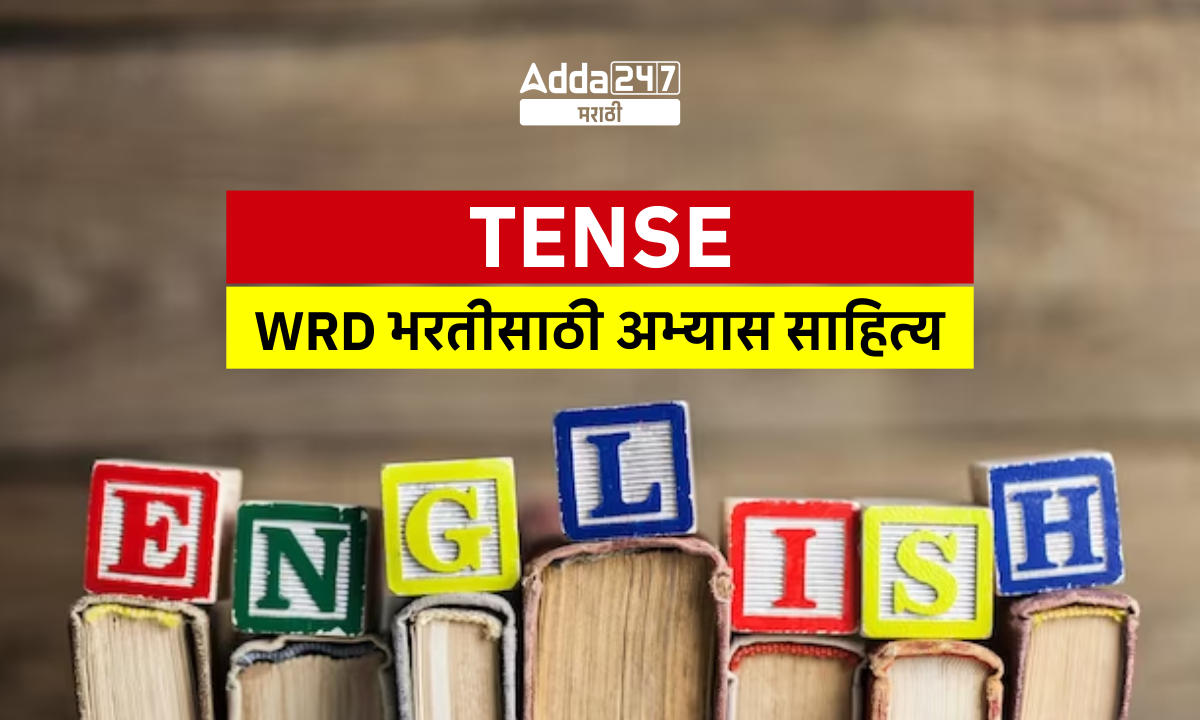Table of Contents
Tense and Types of Tenses
Tense and Types of Tenses: महाराष्ट्रातील तसेच राज्यातील बहुतेक स्पर्धा परीक्षेचा महत्वाचा विषय म्हणजे इंग्लिश. इंग्लिश विषयात जास्तकरून इंग्लिश ग्रामर वर प्रश्न विचारले जातात. नेहमीच्या सरावाने इंग्लिश विषयात चांगले गुण मिळू शकतात. आगामी काळातील सरळसेवा भरती जसे की, WRD जलसंपदा विभाग भरती आणि इतर स्पर्धा परीक्षांमध्ये इंग्लिश ग्रामरला विशेष महत्त्व आहे. इंग्लिश ग्रामर चे रोज वाचन फायदेशीर ठरते. इंग्लिश ग्रामर मधील एक महत्वपूर्ण घटक म्हणजे Tense and Types of Tenses. यावर परीक्षेत हमखास 1 ते 2 प्रश्न विचारले जाऊ शकतात. या लेखात आपण Tense and Types of Tenses व त्यातील महत्वाचे नियम यावर माहिती पाहणार आहोत.
Tense and Types of Tenses: विहंगावलोकन
इंग्रजी व्याकरणाचा अभ्यास करतांना Tense and Types of Tenses या घटकाचा अभ्यास करणे महत्वाचे ठरते. या लेखात Tense and Types of Tensesबद्दल सविस्तर माहिती दिली आहे.
| Tense and Types of Tenses: विहंगावलोकन | |
| श्रेणी | अभ्यास साहित्य |
| उपयोगिता | WRD जलसंपदा विभाग आणि इतर सर्व स्पर्धा परीक्षांसाठी उपयुक्त |
| विषय | इंग्रजी व्याकरण |
| लेखाचे नाव | Tense and Types of Tenses |
| लेखातील प्रमुख मुद्दे |
|
Tense and Types of Tenses
English Grammar for Competitive Exams: Tense and Types of Tenses (काळ व काळाचे प्रकार): कुठल्याही स्पर्धा परीक्षेत सर्वात जास्त विचारल्या जाणारा इंग्लिश ग्रामर मधील घटक म्हणजे काळ व काळाचे प्रकार यावर परीक्षेत हमखास प्रश्न येतोच. खाली काळ म्हणजे काय व काळाचे प्रकार दिलेले आहे.
Tense is the form of a verb that shows when something happened, is happening or is going to happen. (काळ हे क्रियापदाचे असे स्वरूप आहे जे काही घडले, घडत आहे किंवा घडणार आहे हे दर्शवते.)
Types of Tenses with Structural Formula
तक्त्यात S- Subject, O- Object, V1- क्रियापदाचे पहिले रूप, V2- क्रियापदाचे दुसरे रूप, V3- क्रियापदाचे तिसरे रूप, Ving म्हणजे V+ing (eat+ing=eating) असे घ्यावे.
| Tenses | Simple | Continuous | Perfect | Perfect Continuous |
| Present | S+V1+O | S+ am/is/are+ Ving+ O | S+ have/has + V3+ O | S+ have/has + been+ Ving+ O |
| Past | S+V2+O | S+ was/were + Ving+ O | S+ had + V3+ O | S+ had + been+ Ving+ O |
| Future | S+ shall/will + V1+O | S+ shall/will + be+ Ving +O | S+ shall/will + have+ V3 + O | S+ shall/will + have+ been + Ving + O |
खालील तक्त्यात Signal words, Use, Form, Affirmative, Negative, Interrogative वाक्य दिलेले आहेत.
| Tense | Signal words | Use | Form | Example affirmative | Examples negative | Examples interrogative |
| Simple Present | Everyday Sometimes Always Often Usually Seldom Never First …. then |
Something that happens Repeatedly how often Follow another things in general with the Follow verbs (to love, to ) Hate, to think etc. |
Infinitive he/she/it + -s |
I work. He works. I go. He goes. |
I don’t work. He doesn’t work. I don’t go. He doesn’t go. |
Do I work? Does he work? Do I go? Does he go? |
| Present Progressive | now at the moment Look! Listen! |
Something is happening at the same time of speaking or around it Future meaning: when you have already decided and arranged to do it (a fixed plan, date) |
To be (am /are/ is) + Infinitive + ing . | I’m working. He’s working. I’m going. He’s going. |
I’m not working. He isn’t working. I’m not going. He isn’t going. |
Am I working? Is he working? Am I going? Is he going? |
| Tense | Signal words | Use | Form | Example affirmative | Examples negative | Examples interrogative |
| Simple Past |
Last… … ago in 1990 |
The action took place in the past, mostly connected with an expression of time (no connection to the present) | Regular : Infinitive + – ed Irregular: 2. Spalte |
I worked. He worked. I went. |
I didn’t work. He didn’t work. I didn’t go. |
Did I work? Did he work ? Did I go? |
| Yesterday | He went. | He didn’t go. | Did he go? | |||
| Past Progressive | While | An action happened in the middle of another action. Someone was doing something at a certain time (in the past) – you don’t know whether it was finished or not |
Was / were + infinitive + – ing | I was working. He was working. I was working. He was going. |
I wasn’t working. He wasn’t working. I wasn’t going. He wasn’t going. |
Was I working? Was he working? Was I going? Was he going? |
| Tense | Signal words | Use | Form | Example affirmative | Examples negative | Examples interrogative |
| Simple Present Perfect | Just yet Never ever Already so far, up to now, For recently |
You say that, has happened or is finished in the past and it has a connection to the present The action started in the past and continues up to the present. |
Have / has + past participle* (infinitive + -ed) or (3rd column of the table of irregular verbs) |
I have worked. He has worked. I have gone. He has gone. |
I haven’t worked. He hasn’t worked. I haven’t gone. He hasn’t gone. |
Have I worked? Has he worked? Have I gone? Has he gone? |
| Present Perfect Progressive |
All-day The whole day How long Since For |
The action began in the past and has just stopped How long the action has been happening Emphasis: length of time of an action |
Have / has + been + infinitive + -ing. | I have been working. He has been working. I have been going. He has been working. |
I haven’t been working. He hasn’t been working. I haven’t been going. He hasn’t been going. |
Have I been working? Has he been working? Have I been going? Has he been going? |
| Tense | Signal words | Use | Form | Example affirmative | Examples negative | Examples interrogative |
| Simple past perfect | Already just never |
Mostly when two actions in a story are related to each other: the action which has already happened is put into past perfect, the other action into simple past The past of the present perfect |
Had + past participle* *(infinitive + -ed) or (3rd column of the table of the irregular verb) |
I had worked. He had worked. I had gone. He had gone. |
I hadn’t worked. He hadn’t worked. I hadn’t gone. He hadn’t gone. |
Had I worked? Had he worked? Had I gone? Had he gone? |
| Past Perfect Progressive | How long since for |
How long something had been happening before something else happened | Had + been + Infinitive + ing | I had been working. He had been working. I had been going. He had been going. |
I hadn’t been working. H hadn’t been working. I hadn’t been going. He hadn’t been going. |
Had I been working? Had he been working? Had I been going? Had he been going? |
| Tense | Signal words | Use | Form | Example affirmative | Examples negative | Examples interrogative |
| Will – future | Predictions about the future (you think that sth will happen) You decided to do sth. spontaneously at the time of speaking, you haven’t made the main clause in type I of the if clauses |
Will + infinitive | I’ll work. He’ll work. I’ll go. He’ll go. |
I won’t work. He won’t work. I won’t go. He won’t go. |
Will I work? Will he work? Will I go? Will he go? |
|
| Going to – future | When you have already decided to do. In the future What do you think will happen |
Be (am / are / is) + going to + Infinitive | I’m going to work. He’s going to work. I’m going to go. He’s going to go. |
I’m not going to work. He’s not going to work. I’m not going to go. He’s not going to go. |
Am I going to work? Is he going to work? Am I going to go? Am I going to go? Is he going to go? |
| Tense | Signal words | Use | Form | Example affirmative | Examples negative | Examples interrogative |
| Future progressive | An action will be in progress at a certain time in the future. This action has begun before a certain time. Something happens because it normally happens. |
Will + be + infinitive + ing. | I’ll be working. He’ll be working. I’ll be going. He’ll be going. |
I won’t be working. He won’t be working. I won’t be going. He won’t be going. |
Will I be working? Will he be working? Will I be going? Will be going? |
|
| Future perfect simple | Sth will already have happened before a certain time in the future | Will + have + past participle* *(infinitive + -ed) or (3rd column of the table of irregular verbs) |
I’ll have worked. He’ll have worked. I’ll have gone. He’ll have gone. |
I won’t have worked. He won’t have worked. I won’t have gone. He won’t have gone. |
Will I have worked? Will he have worked? Will I have gone? Will he have gone? |
| Tense | Signal words | Use | Form | Example affirmative | Examples negative | Examples interrogative |
| Future perfect progressive | Sth. will already have happened before a certain time in the future Emphasis: length of time of an action |
Will + have + been + infinitive + ing | I’ll have been working. He’ll have been working. I’ll have been going. He’ll have been going |
I won’t have been working. He won’t have been working. I won’t have been going. He won’t have been going. |
Will I have been working? Will he have been working? Will I have been working? Will he have been working? |
|
| Condition Simple | Sth. that might happen Main clause in type II of the If clause. |
Would + infinitive | I would work. He would work. I would go. He would go. |
I wouldn’t work. He wouldn’t work. I wouldn’t go. He wouldn’t go. |
Would I work? Would he work? Would I work? Would he work? |
|
| Conditional progressive | Sth. that might happen Emphasis: length of time of an action |
Would + be + infinitive + ing. | I would be working. He would be working. I would be going. He would be going. |
I wouldn’t be working. He wouldn’t be working. I wouldn’t be going. He wouldn’t be going |
Would I be working? Would he be working? Would I be going? Would he be going? |
| Tense | Signal words | Use | Form | Example affirmative | Examples negative | Examples interrogative |
| Conditional Perfect | Sth that might have happened in the past (it’s too late now) Main clause in type III of the if-clauses. |
Would + have + past participle* *(infinitive + -ed ) or (3rd column of the table of irregular verbs) |
I would have worked. He would have worked. I would have gone. He would have gone. |
I wouldn’t have worked. He wouldn’t have worked. I wouldn’t have gone. He wouldn’t have gone |
Would I have worked? Would he have worked? Would I have gone? Would he have gone? |
|
| Conditional Perfect Progressive | Sth. that might have happened in the past (It’s too late now.) Emphasis: length of time of an action |
Would + have + been + infinitive + ing | I would have been working. He would have been going. I would have been going. He would have been going. |
I wouldn’t have been working. He wouldn’t have been going. I wouldn’t have been going. He wouldn’t have been going. |
Would I have been working?
Would he have been working? Would I have been going? Would he have been going? |
Tense: नमुना प्रश्न
Q1. Identify the tense used in following sentence.
I have been studying since morning.
Answer: b
Q2. The children _______________ in the playground now.
a) has played
b) plays
c) are playing
d) will had played
Answer: c)
Q3. I _______________ her for several years.
a) have known
b) has known
c) knows
d) knew
Answer: a)
Q4. It ________________ raining since afternoon.
a) have been
b) has been
c) is
d) was
Answer: b)
Q5. He ______________ his parents’ house one week ago.
a) left
b) leave
c) leaves
d) is leaving
Answer:a)
महाराष्ट्रातील सर्व स्पर्धा परीक्षांसाठी ऑनलाईन क्लास, व्हिडिओ कोर्स, टेस्ट सिरीज, पुस्तके आणि इतर अभ्यास साहित्य खाली दिलेल्या लिंक वर क्लिक करून मिळावा.
अड्डा 247 मराठी अँप | अड्डा 247 मराठी टेलिग्राम ग्रुप











